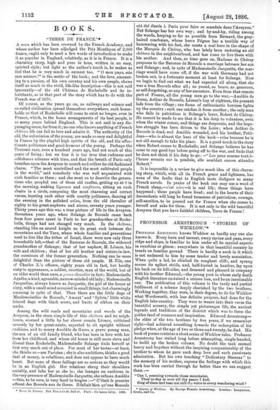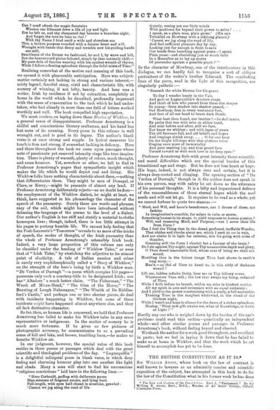PROFESSOR ARMSTRONG'S " STORIES OF WICKLOW."* PROFESSOR ARMSTRONG knows Wicklow
as hardly any one else knows it. Every burn and torrent, every ravine and pass, every ridge and slope, is familiar to him under all its myriad aspects in sunshine or gloom ; everywhere in that beautiful country he treads on familiar ground. There is hardly a nook in it which is not endeared to him by some tender and lovely association. When quite a lad, he climbed its roughest cliffs, and sprang across its ugliest stride, and, half-buried in heather, lay upon his back on its hill-sides, and dreamed and planned in company with his brother Edmund,—the young poet in whose early death English literature sustained a serious loss, and he an inestimable one. The publication of this volume is the tardy and partial fulfilment of a scheme deeply cherished by the two brothers. Working together, they were, in their degree, to do for Wicklow what Wordsworth, with less definite purpose, had done for the English lake-country. They were to weave into their verse the beautiful scenery, the simple yet picturesque life, the ancient legends and traditions of the district which was to them the golden land of romance and inspiration. Edmund Armstrong— the elder of the two brothers by five years, if we remember right—had achieved something towards the redemption of his pledge when, at the age of two or three-and-twenty, he died. His book of poems contains a short series of Wicklow tales. Professor Armstrong has waited long before attempting, single-handed, to build up the broken column. No doubt the task seemed heavy and hopeless without the inspiring companionship of the brother to whom he gave such deep love and such passionate admiration. But his own touching " Dedicatory Stanzas" to the memory of his mother, express the feelings with which this work has been carried through far better than we can suggest them :—
"Can I, yearning towards these mountains, Thus to-day or ever till thy peace I find, Sing of them and hear not still thy voice in every wandering wind ?
• Stories of Wicklow. By George Francis Armstrong. L3adoa : Loagiuxas, Green, and Co. Can I quaff afresh the magic fountains Whence our Edmond drew a life of joy and light
Ere he left us, and thy oheqnered day became a beamless night, And forget the love he bore to thee ?
With thy Name I bind amid a wide and shoreless sea This, a broken purpose rounded with a fainter heart and will, Wrought with hands that droop and tremble now his guiding hands are still, Semblance of the Dream we fashioned, he and I, by wave and hill, Ere the heavenward pinion faltered, struck by that untimely chill,— My poor debt of fancies weaving with his opulent wreath of rhyme, While I follow a fleeting splendour through the fitful mists of Time."
Realising somewhat of the motive and meaning of this book, we opened it with pleasurable anticipation. Here was subject- matter certainly not lacking in strong and various interest,— misty legend, fanciful story, vivid and characteristic life, with scenery of winning, if not lofty, beauty. And here was a writer, Irish by residence if not by extraction, completely at home in the world which he described, profoundly impressed with the sense of consecration to the task which he had under- taken, who had already in more than one field of letters worked worthily and well. The book compelled high expectation.
We must confess, on laying down these Stories of Wicklow, to a general sense of disappointment. Professor Armstrong is a skilful and conscientious literary craftsman, and his hand has lost none of its cunning. Every poem in this volume is well wrought out, and is good in its degree. The author's blank verse is at once strong and supple. In lyrical measures his touch is firm and strong, if somewhat lacking in delicacy. Here and there throughout the book we come upon passages whose note of passionate yet reserved intensity rings like true inspira- tion. There is plenty of warmth, plenty of colour, much thought, and some humour. Yet, somehow or other, we fail to find in Professor Armstrong's pages that sympathetic insight which makes the life which he would depict real and living. His Wicklow folks have nothing characteristic about them,—nothing that differentiates them. They might be men of Donegal, or Clare, or Kerry,—might be peasants of almost any land. If Professor Armstrong deliberately rejects—as no doubt he does— the employment of the Wicklow dialect, he might at least, we think, have suggested in his phraseology the character of the speech of the peasantry. Surely there are words and phrases, racy of the soil, which might have been introduced without debasing the language of the poems to the level of a dialect. Our author's English is too stiff and stately a material to clothe homespun lives ; though, indeed, there is too little attempt in his pages to portray humble life. We cannot help feeling that the Poet-Laureate's "Tomorrow" reveals to us more of the tricks of speech, the modes of thought, of the Irish peasantry than the whole of Professor Armstrong's ostensibly Irish book. Indeed, a very large proportion of this volume can only be classified under the heading of " Wicklow Tales," or even that of " Irish Tales," by stretching the adjective to its utmost point of elasticity. A tale of Italian passion and crime is surely very unphilosophically called a " Story of Wicklow," on the strength of the hero's being by birth a Wicklow man. "De Verdun of Darragh "—a poem which occupies 150 pages— possesses only such a courtesy-title to be designated Irish; nor has " Altadore " a much better claim. "The Fisherman," "The Wreck off Mizen-Head," " The Glen of the Horse," " The Bursting of Lough Nahanagan," "The Wraith of De Riddles- ford's Castle," and perhaps one or two shorter pieces, do deal with incidents happening in Wicklow, but some of these incidents might have happened almost anywhere else, and they all lack distinctive character.
So far, then, as human life is concerned, we hold that Professor Armstrong has failed to make his Wicklow tales in any sense representative or indigenous. In the matter of scenery be is much more fortunate. If he gives us few pictures of photographic accuracy, he communicates to us a pervading sense of hill and lake, and brown, tumbling burn,—he makes us breathe Wicklow air.
In our judgment, however, the special value of this book resides in those poems or passages which deal with the great scientific and theological problems of the day. "Lugnaquillia " is a delightful colloquial poem in blank verse, in which deep feeling and charming humour play into one another like light and shade. Many a man will start to find his unconscious "religious convictions " laid bare in the following lines :—
" Here Corbould, puffing with deliberate pause Blue streams of fragrant smoke, and lying back Full-length, with eyes half-closed in sunshine, growled : Cannot we jog along the road of life
Quietly, vexing not our little minds With problems far beyond their power to solve ? . I speak, as a plain man, plain prose.' (His eye Twinkled on Mowbray with a sidelong glance.) Cannot we jog along the road of life, And find sufficient pleasure day by day, Looking just far enough in front to save Our heads from knocking against posts—I speak Plain prose—and cherishing just so much faith In a Hereafter as to lay up stores Of provender against a possible pinch ?' " In the character of Mowbray, one of the interlocutors in this dialogue, we can hardly fail to recognise a sort of oblique portraiture of the writer's brother Edmund. The concluding lines of the poem, read in the light of this recognition, are singularly pathetic :-
" Beneath the white Sierras lies his grave.
Today I wander lonely in the Vale, And gaze at Lugnaquillia's desolate crags, And think of him who passed from these dim shapes
So young—from shadow into shadow passed,—
Oar Mowbray, first in every venturous feat, And first of all our band to brave dark Death.
What bast thou found, our brother ?—In dull tracts, By paths that ran with mist on either hand, And mist before and after, still we fare, Nor know we whither ; and with lapse of years The old fervours fail, and old beliefs and hopes And longings shrink away. . . . 0 for one hoar On the bright hill-tops with that glorious voice Singing once more of immortality And pure aspiring joy, and that grand face Turned toward us with such love in its deep eyes !"
Professor Armstrong feels with great intensity those scientific and moral difficulties which are the special burden of this transitional age and stage. But he does not lose heart or hope. His hope, indeed, is not always sure and certain, but it is always deep-rooted and clinging. The opening section of " De Verdun of Darragh," though in it the author does not speak in his own person, may with safety be set down as the utterance of his personal thoughts. It is a lofty and impassioned defence of the reasonableness of those eternal hopes which the soul needs and will not let go. It requires to be read as a whole, yet we cannot forbear to quote two stanzas :-
" Mind, and Will, and Love's beneficence, can I dream of these, nor fashion
In imagination's crucible, for solace in calm or storm, Something human in its shape, to yield response to human passion ? Will, and reasoning Mind, and Parpose,—can I sever their life from Form ?
Can I feel the Thing that Is, the dread, profound, ineffable Wonder, That abides and throbs about me, which I seek to see iu vain, And not clothe It in light for raiment, mix Its going with noise of th under,
Granting still the Form I cherish but a fantasy of the brain ? Do I sin against Thy might, against Thy measureless depth and glory. 0 Thou dread inscrutable God, whose seas of being we shall not sound, Moulding thus in the fairest image Thou hest shown in earth's long story,— Man'e,—an idol of Thee to kneel to, in this eddy of darkness wound ?
Lift me, hidden infinite Deity, bear me on Thy billowy ocean Wheresoever Thou wilt ; the law that sways my being, ordained of Thee, While I drift before its breath, within me stirs in kindred motion All my spirit in awe and reverence with an equal certainty ; And I yield to the power constraining with a ready, a full surrender, Trusting Thee in the roughest whirlwind, in the cloud of the thickest night, While I watch and hope in silence for the dawn of a richer splendour, Musing, What new gift awaits me, what of Knowledge, or Love, or Light P "
Hardly any one who is weighed down by the burden of the age's problems could read this section—practically an independent whole—and other similar poems and passages in Professor Armstrong's book, without feeling braced and cheered.
We thank the author for a work good throughout, and excellent in parts ; but we feel in laying it down that he has failed to make us at home in Wicklow, and that the work which he set himself to accomplish has yet to be done.



































 Previous page
Previous page